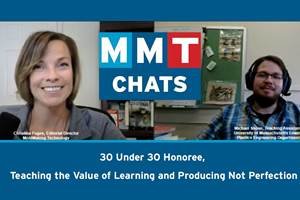Measuring to Manage
A five-step process for appropriate employee evaluations.
Giving a speech in public is one of the most dreaded fears among humans. Among managers, the most dreaded fear is giving an employee an evaluation. Many managers would rather be evaluated than give an evaluation.
Evaluation time should be an opportunity for supervisors and subordinates to sit down and go over past performance based on “measurable” goals and lay out measurable goals for performance improvement. For most companies the first quarter of the year is employee evaluation time.
When the economy was in a down cycle your company or department likely eliminated (downsized) any employee who wasn’t producing up to the company standard. What most companies found when they terminated those employees was that the company standard was not even known by the employee. Now that the economy is on an upswing, many good employees are looking to leave their current job for a more challenging and rewarding opportunity elsewhere. The challenge for today’s manager is how to keep these good employees.
Employees are a manager’s greatest asset. Therefore, shouldn’t we give them an evaluation system that works? One that measures their performance: daily, weekly and yearly?
The desire to measure is universal. So, why don’t we do more of it? All phases of a business usually are measured; generally they are measured in a way that by the time the results are made public it’s too late to make any improvements. In most cases this causes the company tremendous financial hardship.
The following are five critical steps that will help you make your employee evaluations more meaningful and measurable:
1. State what the company’s ultimate goals are for the employee’s position. Once the overall “measurable” goals are set, evaluations become a discussion as to what more can be done in certain areas; what should be done less in certain areas; and, what new things should be started and what tasks should be stopped.
2. Identify smaller goals that when accomplished show the employee is on his/her way to accomplishing the ultimate goals. The same measurements you use to evaluate employees’ daily work can be expanded into their yearly evaluation. In sales it’s generally number of orders booked, number of dollars per order, sales numbers for the “item of the month,” etc. These results can then be measured against the company standard, and then the employee can evaluate themselves daily.
3. List all the measurable criteria you can think of to show how the employee is proceeding on the smaller goals. In today’s business climate, employees are paid for accomplishments, not activities, so those are the areas you want to target with measurements. Clarity is essential. During the evaluation, notes should be taken by both the manager and subordinate, thus at
the end of the evaluation there will be no doubt as to what is being measured and how.
4. Research your measurable criteria. Find some examples in your company of how a better-defined goal results in an accomplished goal. Share this information with the employee. We generally look at the sales position as one of the easiest to measure, but by taking a close look at all company positions, you can evaluate all positions through measurable criteria.
- Receptionist: Are all calls answered by the third ring?
- Human resources: Do new hires in all departments stay longer than your industry average?
- Marketing: Do marketing campaigns yield the appropriate number of leads?
- Accounting: Are financial reports available on the date due?
These are just a few examples. A good manager will be able to list many measurable goals for any department. Employees also can be a good source for suggestions of measurable criteria.
5. Have the employee verbally and in writing agree with the plan. This final step assures that the manager and subordinate are in agreement. If employees do not understand exactly what their job is, they will always feel overwhelmed. Confusion is a very time-consuming mistake.
With agreed-upon measurable goals, any employee can give themselves a daily, weekly or monthly evaluation. Employees will then begin to motivate themselves. They will know exactly what it takes to become a success and get promoted through the clear
understanding of their role in the company.
Goals that are set by using measurable criteria and shared with the employee make the dreaded employee evaluation much less stressful. Evaluation time becomes a time for constructive discussion where both the employee’s and company’s needs are addressed and measurable criteria are discussed for salary increases and promotions. Isn’t that what matters most—companies pursuing their goals in harmony with employees pursuing theirs? That’s a win-win for everyone.
Action: Use measurable data to get maximum employee performance.
Related Content
Women Impacting Moldmaking
Honoring female makers, innovators and leaders who are influencing our industry's future.
Read MoreICYMI, MMT Chats: 30 Under 30 Honoree, Plastics Engineering TA Teaches Value of Learning and Producing Not Perfection
MoldMaking Technology Editorial Director Christina Fuges brings on UMass Lowell Plastics Engineering Teaching Assistant Michael Shone as a guest for this MMT Chat to discuss moldmaking through the lens of academia. This episode is brought to you by ISCAR with New Ideas for Machining Intelligently.
Read MoreMMT Chats: Marketing’s Impact on Mold Manufacturing
Kelly Kasner, Director of Sales and Marketing for Michiana Global Mold (MGM) talks about the benefits her marketing and advertising, MGM’s China partnership and the next-generation skills gap. This episode is brought to you by ISCAR with New Ideas for Machining Intelligently.
Read MorePredictive Manufacturing Moves Mold Builder into Advanced Medical Component Manufacturing
From a hot rod hobby, medical molds and shop performance to technology extremes, key relationships and a growth strategy, it’s obvious details matter at Eden Tool.
Read MoreRead Next
How to Use Strategic Planning Tools, Data to Manage the Human Side of Business
Q&A with Marion Wells, MMT EAB member and founder of Human Asset Management.
Read More













.jpg;maxWidth=300;quality=90)

_300x250 3.png;maxWidth=300;quality=90)





